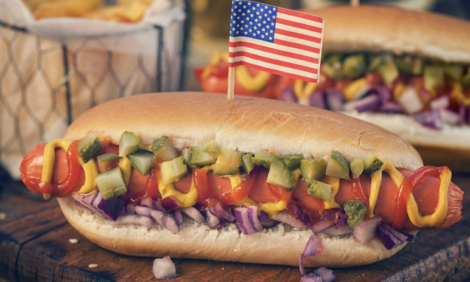Congress Debates Country Of Origin Labeling Laws
US - Recent testimony in a House committee hearing underscores the continued lack of consensus about what the law says, how it should be implemented, and whether or not it will ultimately do more harm than good...
|
Need a Product or service?
|
|
...according to Rep. Bob Goodlatte, R-Va., chairman of the House Committee on Agriculture, reports Delta Farm Press.
The country of origin labeling provision contained in the 2002 farm bill instructs retailers to attach country of origin labeling on fresh fruits and vegetables, red meats, seafood, and peanuts, beginning Sept. 30, 2004. The program is voluntary until then.
"This is a hotly debated issue in agriculture circles in Washington, D.C., and how it will play out remains to be seen," says Hunt Shipman, chief of staff for the Senate Agriculture Committee.
In recent action on the issue, the House Appropriations Subcommittee on Agriculture voted against the funding needed to enforce a labeling mandate. The House version of the agriculture appropriations bill would also postpone implementation of the mandatory provisions of country of origin labeling for an additional year.
At a House Committee on Agriculture hearing to review mandatory country of origin labeling, Goodlatte says, "I have always favored a voluntary approach. This hearing reinforces my belief that we are moving forward with an idea that will have a negative impact on our producers, and little or no benefit for those it was intended to help."
"We have heard many concerns expressed regarding the implementation of country of origin labeling by both the proponents and opponents of the program," says Ranking Committee Member Charlie Stenholm. "From the testimony received, it is apparent that if we are going to have country of origin labeling, more work is needed on the current proposal."
While groups like the National Pork Producers Council believe the mandate offers little value to pork producers or consumers, groups like the American Farm Bureau Federation feel differently about the issue.
"Country of origin labeling is simply a labeling program to distinguish U.S. products," says Alan Foutz, president of the Colorado Farm Bureau.
Foutz says labeling will allow consumers to differentiate between U.S. products and foreign products, and will allow U.S. producers to promote the "excellent products they take great pride in producing."
The mandate can be implemented, he says, will little burden and little additional cost to producers. "The labeling law purposefully includes meat, fruits, vegetables, peanuts and fish. It is important to carry out the law as passed in the farm bill, and not split up commodities during implementation because it weakens the entire labeling program," Foutz says. "All of the covered commodities in the law can be verified without great cost and recordkeeping requirements in cooperation between all segments of the industry."
Not true, says Jon Caspers, president of the National Pork Producers Council, whose organization believes the labeling law will impose large costs on pork producers.
"This law has little to do with the consumers' right to know about their food. If it did, it would fail miserably," Caspers says. "The mandatory country of origin law is not a food safety law. It is a trade protectionist law designed to restrict access to U.S. retail meat cases. The law will not enhance the U.S. government's ability to address food safety emergencies, or foreign animal disease outbreaks, nor will it provide additional food safety assurances for U.S. consumers."
Contentiousness on the issue in the House and the Senate is mirrored within the Senate Agriculture Committee, according to Shipman.
"It's not a partisan issue in the agriculture committee, the appropriations committee, or the full Senate, and our ability to find consensus depends on the mix of both bipartisanship and regional balance," he says. "It's very likely that we'll have more hearings in the Senate on this issue."
Before the Senate Ag Committee convenes hearings, the issue is likely to be dealt with through the appropriations process, Shipman says. A provision in the House agriculture appropriations bill delaying implementation of the country of origin labeling requirements for another year makes that avenue even more likely.
"I do think the fight in the Senate will be a little harder fought," he says. "We've still got to see what the full House of Representatives debate will be on the issue. It's a question of whether or not we can get our hearings done before we face the issue itself in the appropriations process."
Source: National Pork Producers Council (NPPC) - 21st July 2003















